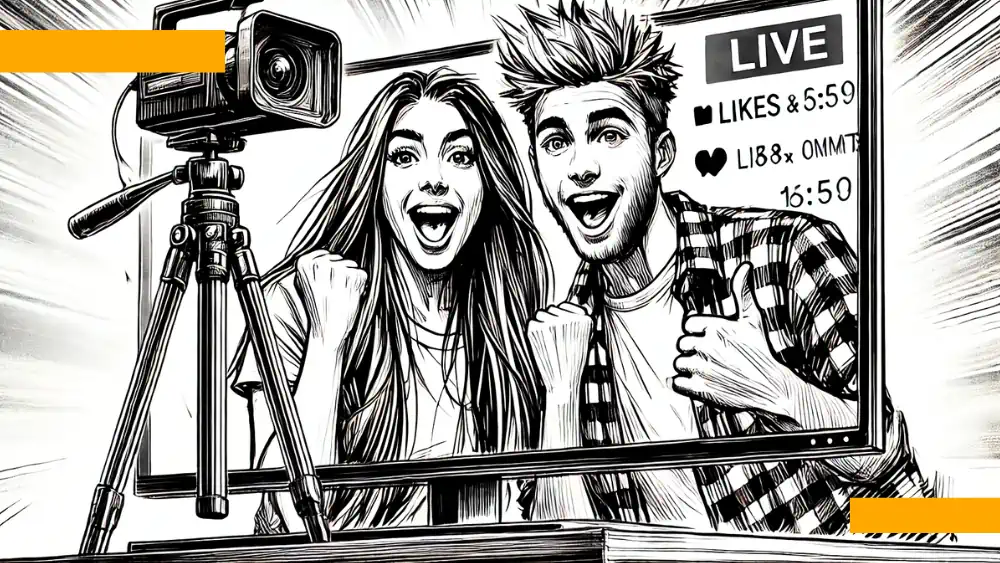 illustration: DALL-E
illustration: DALL-EAs highlighted by the authors of the "Behind The Screens" report, published at the end of 2024 by UNESCO, digital creators operate for various reasons. Most frequently, they emphasize sharing knowledge (26%), earning income (23.8%), and providing entertainment (23.4%). Less common motivations include expressing opinions (13.8%) or promoting specific causes (5.8%).
For instance, Amanda da Cruz Costa from Brazil emphasizes her engagement in climate activism, while Faith Sycaoyao from the USA sees her mission as inspiring others through art. Creators, despite working in different fields, combine personal passions with a mission to influence the world.
Main Motivations:
- Sharing knowledge: 26%
- Earning income: 23.8%
- Entertainment: 23.4%
- Expressing opinions: 13.8%
- Promoting causes: 5.8%
Content Credibility Issues
A significant portion of creators (62%) admit that they do not thoroughly verify information before publishing. Popularity – measured by likes and views – is their main indicator of credibility (41.7%). Further down the list are recommendations from friends (20.6%) and evidence in the content (17%).
| Indicator | Percentage of Creators |
|---|---|
| Popularity (likes, views) | 41.7% |
| Recommendations from friends | 20.6% |
| Author’s reputation | 19.4% |
| Evidence and documentation | 17% |
The lack of systematic data verification poses risks to content audiences. UNESCO recommends intensifying training for creators to promote better media practices.
Law, Ethics, and Hate Speech
The study reveals that 59% of creators are unaware of regulations regarding freedom of speech or copyright laws. Only 32.4% of respondents claimed a good understanding of these regulations.
Insufficient legal knowledge is also linked to ethical issues. Only 50% of creators always disclose their content sponsors, undermining the transparency of their actions. This points to the need for implementing ethical standards in the influencer industry.
One of the biggest challenges for creators is hate speech. As many as 32.3% of respondents have experienced it firsthand, with 31.5% ignoring such incidents and only 20.4% reporting them to platforms.
Creators and Social Media Platforms
The relationship between creators and platforms is crucial for their success. The report indicates that 67.8% of respondents find platform guidelines clear, although most believe that technical support could be improved.
| Aspect | Percentage of Respondents |
|---|---|
| Clarity of guidelines | 67.8% |
| Content moderation | 64.6% |
| Technical support | 65.9% |
| Safety management | 69.3% |
Introducing better algorithms and a more human approach to moderation could improve the quality of collaboration between creators and platforms.
Training and Support
The report highlights a significant demand for training. Only 13.9% of respondents have participated in any ethics or legal courses, although 73.7% expressed interest in free UNESCO programs.
What Can Help Creators?
- Access to training in ethics and law.
- Tools to combat hate speech.
- Better collaboration with social media platforms.
Implementing such initiatives would allow creators to operate more responsibly and professionally. The UNESCO report shows that digital creators play a key role in shaping public opinion and promoting credible content. However, for their influence to be positive, they need support through training, regulations, and better relations with platforms.
The research was conducted on a group of 500 creators from 45 countries and included 20 in-depth interviews. The full UNESCO "Behind The Screens" report is available for free at https://news.un.org/en/story/2024/11/1157546.
COMMERCIAL BREAK
New articles in section Media industry
Freelancers 2025 in media and advertising. Useme report
Krzysztof Fiedorek
The modern media and communication market presents entirely new challenges for independent creators. Traditional services are giving way to more complex forms of messaging. The most popular industries in which Polish freelancers operate focus on companies' online presence and visual content.
Video content in Poland. What and how we watch
Paweł Sobczak
Video content is watched remotely, but streaming services are mainly enjoyed in the comfort of home. This is how the consumption of audiovisual content by Poles in 2025 can be summarized. This is the result of an analysis of a study conducted by SW Research and data from the company MEGOGO.
How artificial intelligence misrepresents the news. PBC analysis
Sylwia Markowska
In news summaries generated by the most popular models in Polish, as many as 46% of responses contained at least one significant error, 27% had serious issues with sources (missing, misleading, or incorrect), and 19% contained hallucinations and outdated information.
See articles on a similar topic:
Artificial intelligence in newsrooms. Three realities of the AI era in media
Krzysztof Fiedorek
According to a report by the European Broadcasting Union, many newsrooms already use AI but still do not fully trust it. Audiences do not want "robotic" news, and the technologies themselves though fast can be costly, unreliable, and surprisingly human in their mistakes.
Cyberviolence and hate disguised as a joke. The RAYUELA report on youth
Krzysztof Fiedorek
The study conducted in five countries reveals a harsh truth. Online violence is not evenly distributed. It is a digital map of prejudice that hurts the most those who stand out the most. "It’s just a joke." That’s how violence often begins. Young people go through it in silence.
Milgram Experiment 2023. AI Can Encourage Violence
KrzysztoF
Researchers from SWPS University replicated the famous Milgram experiment, in which participants were instructed to inflict pain on another person under the authority’s command. This time, the authority was a robot. It’s the first study showing that people are willing to harm another person when a robot commands them to do so.
"No One Should Know the Truth" [DOCUMENTARY FILM]
BARD
According to the Belarusian Association of Journalists, around 554 journalist detentions occurred in Belarus between August 2020 and July 2023. Criminal charges were brought against 73 media workers, and 33 of them remain in prison to this day.






























